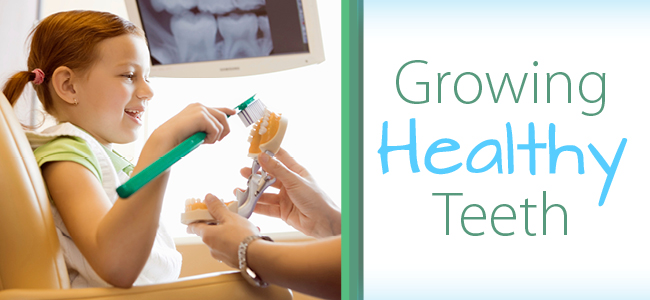
Motherhood is both wonderful and challenging. Most women agree that the only way to truly understand what being a mom is like is to become one. Once you have had children, they become your main focus, the purpose behind everything you do…and don’t do.
It’s not uncommon for women to neglect themselves after having a baby. From missing the daily shower to going an extra month or two without a haircut, it’s natural for mothers to reroute all of their resources to their child or children, whether that be time, money, or energy. But could that self-neglect be having a negative affect that extends beyond Mom?
Healthy Mom Equals Healthy Child
According to a study published in the Journal of Dental Research (Jan. 19, 2011)1, moms’ oral health predicts their children’s oral health. This 27-year-long study found that if mothers had poor oral-hygiene practices while their children were young, the children had a higher rate of dental caries and poor overall oral health as adults. The study was conducted in New Zealand and consisted of 835 mothers who participated in a self-rated survey and 1,000 children who were examined at age 5 and then again at 32 (more than 900 examined at this time).
The results were overwhelming. Almost half of the children with mothers who had poor dental health suffered from tooth decay and eventual tooth loss as adults.
Bad News or Good?
Initially, these results may sound like bad news, but they support the belief that when moms take time to care for themselves, they are also taking care of their children — a little relief from guilt for mom.
Oral hygiene and dental care should not be seen as optional for mothers; they are crucial to Mom’s self-esteem and overall health, as well as for the children’s health and well-being.
So what does putting the right amount of time and energy into dental care mean for Mom?
- Making sure to brush at least twice a day with fluoride toothpaste
- Flossing every day
- Minimizing the amount of sugary foods that are consumed
- Scheduling and attending regular checkups and cleanings
Some common oral health conditions can be staved off with good oral-hygiene practices and regular checkups:
Periodontal disease: The best way to avoid gum disease is by sticking to your at-home oral-hygiene routine. Flossing is particularly important. When plaque and tartar remain on teeth, a mild form of periodontal disease can occur, called gingivitis, in which the gums bleed and become red and swollen. Gingivitis is reversible, and it can be treated. However, when left untreated, the gum disease worsens, leading to an advanced form called periodontitis that can cause severe damage to the soft tissue that supports the teeth, resulting in infection and eventual tooth loss.
Oral cancer: According to the American Dental Association, 41,000 Americans will be diagnosed with oral and throat cancers this year. Oral or mouth cancer reveals itself as a growth or sore in the mouth or throat that doesn’t go away with time. When you come into our office for your regular checkup, we provide a potentially life-saving oral cancer screening. Our oral cancer screenings consists of a verbal, visual, and physical examination, and they significantly increase your chance of a full recovery should cancer be found. We are your first line of defense for early detection.
Having a healthy mouth and a beautiful smile are key to Mom feeling good about herself. Whether the special mother in your life is yours, someone you know, or you yourself, consider treating her to a teeth-whitening treatment. Sometimes having brighter teeth can give Mom that boost she needs. Feeling good about yourself is important, especially when life gets hard. As your family dentist, we understand that while dark and stained teeth can be healthy, they can also make you look tired, worn down, and older than you really are. Mom deserves better.
Modern-day whitening treatments are fast, effective, and affordable, and they can whiten teeth up to 14 shades brighter. There is no quicker way to make Mom feel as amazing as she is. And remember, when Mom is happy, everyone is happier!
Call today to find out more about how you can help Mom and the whole family stay healthier and happier.
1. http://jdr.sagepub.com/content/90/5/672
More

Have you ever wondered why dentists and other dental and oral health professionals spend so much time talking about your smile? Shouldn’t they focus more on your teeth?
As dental health professionals, we know that your oral health affects a whole lot more than just your teeth. You may think your smile is just another way to communicate your happiness, but we know it does so much more than that. Smiling regularly can improve your mood and even your health. But when you hide your smile because you are embarrassed of crooked, chipped, or cracked teeth, you not only miss out on all of the benefits of smiling, but your self-esteem and confidence plummet as well.
Benefits of Smiling
Smiling — even when you may not feel like it — provides some surprising benefits. The following are just a few.
Healthier Heart. According to a study published in Psychological Science, smiling helps you recover from stress and upset. Researchers found that participants who smiled during a stressful situation had a lower heart rate when recovering. Smiling is also credited for lowering blood pressure. The more you smile, the less likely you are to develop heart disease.
Makes You Happy. The act of smiling releases endorphins. If you’ve ever gone running or worked out, then you’ve probably experienced the elation brought on by endorphins (also known as a runner’s high). When your body releases endorphins, your mood is naturally elevated.
Reduces Stress. Those endorphins that make you feel happy also reduce stress. Between the endorphins and the lower heart rate, you could feel downright calm and cool, even when life’s intensity starts to heat up.
Improves Relationships. Study after study has shown that people are more likely to trust someone with a genuine smile. Feeling connected to others is key to enjoying an enriched life. The more you smile, the more likely you are to form close, lasting relationships with others.
Minimizes Pain. Those endorphins that smiling and laughing release have been shown to reduce pain significantly, in some cases up to 40%.
Smiling Is Contagious. When you smile, approximately 50% of the time people smile back. There is an area in your brain that is responsible for your facial expressions, and as it turns out, the act of mimicking someone else’s smile is an unconscious automatic response. In fact, one Swedish study found it takes effort to frown when you see someone else smiling. So when you smile, you are spreading all of the benefits that come along with smiling to everyone who smiles back. Way to pay it forward!
How We Can Help You Smile
As your oral health provider, your overall health and happiness is our primary concern. We understand that if you aren’t smiling, then you aren’t receiving all of the benefits from our services that are available to you. If your teeth are keeping you from smiling, we have a suite of services that can fix a wide variety of conditions.
Dental Implants. Implants offer a permanent solution for missing teeth. Not only do they look and feel like natural teeth, they also maintain your facial structure and integrity.
Crowns. Porcelain crowns are the perfect restoration for cracked, chipped, or broken teeth. These natural-looking covers make imperfections in teeth entirely unnoticeable.
Teeth Whitening. We offer both at-home and in-office treatment options using the most effective teeth-whitening systems available today. All treatment options are simple and noninvasive.
Porcelain Veneers. These ultrathin, tooth-colored coverings are custom made and are fit to the front surface of your teeth, changing the appearance to the size and shape you desire. Veneers are perfect for fixing discolored and chipped teeth.
Straightening. Straightening your smile no longer requires years of wearing metal wires on your teeth. There are a variety of “invisible” straightening options, such as Six Month Smiles® and Invisalign®, which allow you to have a straighter, more aesthetically pleasing smile in a matter of months.
We are also here to help you with your routine oral hygiene so that your mouth feels as good as it looks.
If you find yourself holding back from smiling and laughing because of how you feel about your teeth, call us today to find out more about how we can help you feel better, live healthier, and smile more.
1. Kraft TL, Pressman SD. Grin and bear it: the influence of manipulated facial expression on the stress response. Psychological Science 2012;23:1372–1378.
2. Sonnby–Borgström, M. Automatic mimicry reactions as related to differences in emotional empathy. Scandinavian Journal of Psychology 2002;43:433–443.
More

Few parents realize that their children are at risk for tooth decay from the moment the first tooth appears (around 6 months). Even though baby teeth are temporary, they are important; they serve as placeholders for adult teeth, and if they are lost too early, their adult replacements may grow in too early and affect the position of permanent teeth that come in later. Tooth decay and damage can also lead to issues with speech development that require therapy for correction later in life.
Pediatric dental disease is the number-one chronic childhood illness, and it continues to plague children throughout the course of their development and into their adult years — but it doesn’t have to. Teaching children good dental habits at an early age and making sure they attend routine dental visits goes a long way toward helping them maintain a pain-free, healthy, and beautiful smile for a lifetime.
The following information functions as a road map for understanding your children’s oral development and health throughout their ages and stages.
Birth to 1 Year
You should be caring for your baby’s teeth before they even appear. Infant toothbrushes come in a variety of sizes and shapes. Most are made out of a soft BPA-, lead- and phthalate-free silicone and have tiny bristles parents can use to gently brush gums after each feeding. Once your baby is old enough to sit and hold objects, there are similar brushes that resemble teething rings, which babies can hold and massage their own gums with.
Your child should have his or her first dental exam by the time they are 1 year old.
When Baby’s First Tooth Appears
As soon as baby’s first tooth appears, you should begin brushing with the infant toothbrush and water twice a day. Sugars are detrimental to teeth, and too much can quickly lead to tooth decay. Try to limit your child’s juice intake to one cup a day. Also, be aware of your child’s sucking behaviors and habits. If your baby sucks his or her thumb, finger, or pacifier, now is a good time to start planning out how you will break the habit. Regular sucking can negatively affect your child’s bite.
Your pediatrician will inspect your child’s teeth at each well-child exam and will refer you to a dentist should any concerns arise. You should consult with your pediatrician about fluoride, sealants, and additional ways you can support your child in the development of excellent oral hygiene habits.
2 Years
By the time your child is 2 and a half, they should have all of their baby teeth. At the age of 2, your child is ready to start learning how to brush their own teeth two times a day. Soft-bristled, child-size toothbrushes are available and make reaching difficult spots easier for uncoordinated little hands. At this age, your child can use a pea-size amount of toothpaste with fluoride. Allow them to brush their own teeth for a couple of minutes, then finish by taking the brush and making sure every tooth has been gently scrubbed. Once you are finished, have your child spit the remaining toothpaste into the sink.
Tips for Avoiding Toddler Tooth Decay
- Avoid sugary snacks and drinks.
- If your child needs milk or formula before bedtime, make sure to rinse their mouth out prior to laying them down.
- If your child requires a bottle at bedtime, fill it with water.
6 Years and Beyond
Your child will start losing their primary teeth around 6 years. They will continue to lose primary teeth and gain most of their permanent teeth until around the age of 13, when they should have 28 permanent teeth. If there is enough room, their final teeth — the wisdom teeth — will erupt around the age of 17. If your child’s dentist believes room is limited, he or she may recommend that the wisdom teeth be removed.
A variety of dental issues may arise throughout the course of your child’s development. Regular dental visits will ensure that they are caught and dealt with early. Children no longer have to wait until they are adolescents to have their first orthodontist visit. Issues requiring orthodontics can be attended to starting as early as 6 years old. This doesn’t mean treatment will be started right away, but the orthodontist will be able to determine the earliest possible time treatment can begin.
Orthodontia has come a long way, and treatments don’t have to take place late in life, nor do they take as long. With the right oral hygiene habits and the proper dental care, your child can have a beautiful, healthy smile well before they walk down the graduation aisle.
For more information about how to care for your children’s teeth as they grow, call us today. We are here to ensure that your most precious family members enjoy a lifetime of beautiful, healthy, and happy smiles.
More

The smile is one of the most powerful features of the human face. It conveys meaning and emotions in an instant. It can catch the eye of that special someone or soothe the tears of your little child.
Throughout history, smiles have inspired artists and the arts, sparking the inspiration that has led to famous paintings, beautiful songs, and even the writing of poems. As your Lancaster dentist, we have been so inspired by smiles that we have dedicated our profession and our passion to caring for them. Whether keeping them healthy or restoring or beautifying them, we wake up every day motivated by the impact a healthy, happy smile can have on the lives of individuals and entire communities.
This April is National Poetry Month. We would like to take this opportunity to demonstrate our love for pearly whites by sharing with you some of our favorite quotes and sayings about smiles.
Our Favorite Quotes About Smiles
“Sometimes your joy is the source of your smile, but sometimes your smile can be the source of your joy.” —Thich Nhat Hanh
“Too often we underestimate the power of a touch, a smile, a kind word, a listening ear, an honest compliment, or the smallest act of caring, all of which have the potential to turn a life around.” —Leo Buscaglia
“A warm smile is the universal language of kindness.” —William Arthur Ward
“A smile is happiness you’ll find right under your nose.” —Tom Wilson
“Don’t cry because it’s over. Smile because it happened.” —Dr. Seuss
“Peace begins with a smile.” –Mother Teresa
The Smile
By William Blake
There is a Smile of Love
And there is a Smile of Deceit
And there is a Smile of Smiles
In which these two Smiles meet
And there is a Frown of Hate
And there is a Frown of Disdain
And there is a Frown of Frowns
Which you strive to forget in vain
For it sticks in the Hearts deep Core
And it sticks in the deep Back bone
And no Smile that ever was smild
But only one Smile alone
That betwixt the Cradle & Grave
It only once Smild can be
But when it once is Smild
Theres an end to all Misery
If you would like to find out more about how we can help you keep your smile in art-inspiring condition, give us a call and set up your next appointment. We offer general-dentistry services such as regular cleanings, fluoride treatments, and sealants — all designed to protect your teeth from decay and harmful cavities.
We also provide restorative services such as porcelain crowns and inlays and onlays designed to restore cracked and broken teeth. These procedures can relieve dental discomfort and give you back your confidence so that you can spread happiness every time you grin.
Is your smile missing something? Our beautiful, natural-looking, permanent dental implants will make your smile whole again so that you can enjoy eating and speaking without reservation.
We are here to help keep your teeth and oral health in the best condition possible so that you can confidently share it with the world.
Happy National Poetry Month from our dental family to yours.
More

A Healthy Smile Is Your Best Accessory
Body piercings have become increasingly prevalent over the past decade, and with more and more celebrities like Victoria Beckham, Tyrese, and Christina Aguilera sporting them, they are only gaining popularity among people of all ages. While piercings offer people the opportunity to express their individuality and add some extra bling to their personal style, some of the most popular piercings are located in the mouth area, which can lead to the rapid deterioration of oral health.
Popular face and mouth piercings include those in the tongue, lip, and cheek areas. The following are just some of the health risks and side effects associated with these piercings.
- Infection: Your mouth is home to a large number of bacteria that breed in moist environments. This is the perfect environment for an infection to occur. When an infection occurs in your mouth, it can become life threatening if not treated immediately.
- Excessive bleeding: On occasion a blood vessel gets punctured during the piercing process and results in prolonged bleeding. If not dealt with properly, severe blood loss can cause complications.
- Damaged gums and teeth: People with mouth piercings often develop the habit of playing with them, which may include biting and twirling them around the mouth. This can lead to scratched, cracked, and broken teeth and fillings. It can also damage the gum line.
- Allergic reactions: Sometimes people may unknowingly be hypersensitive to metals and can experience an allergic reaction.
- Nerve damage: Numbness at the site of the piercing is common. However, in some cases it remains a permanent condition due to nerve damage.
- Excessive saliva: Heavy salivation can result from wearing jewelry in your mouth. This can cause complications with your ability to chew and swallow correctly. It can also interfere with the pronunciation of words.
If you do decide to get a face or mouth piercing, or if your child or adolescent has one, be prepared for four to six weeks of healing time. The following are some tips that will help you maintain your oral health should you decide to keep or get a mouth piercing:
- Make sure to keep the piercing site clean after you eat. Clear away any food particles by using mouthwash after each meal.
- Remove all jewelry when participating in sports, and ask the dentist about getting a mouthguard for protection.
- If you notice that you are developing habits that include biting or clicking your piercing against your teeth, stop immediately or consider removing the jewelry.
- If you think you may have an infection or might be developing an allergic reaction to the metal in your mouth jewelry, remove it immediately and call your doctor.
Choosing to get a facial or oral piercing is an aesthetic decision that impacts your oral and whole health. Your at-home oral hygiene routine will be more important than ever should you choose to get one, as will your routine visits to the dentist and your dental cleanings. Make sure to let our provider know if you have an oral or mouth piercing so that he can help create a dental plan that will protect and maintain your best oral health.
To find out more about mouth piercings, your oral health, and how we can help protect your teeth and gums, give your Lancaster dentist a call at (661) 952-7865 today.
More





